| Srl | Item |
| 1 |
ID:
132731
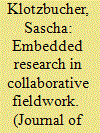

|
|
|
|
|
| Publication |
2014.
|
| Summary/Abstract |
In the era of the "scientific development concept" of the Hu/Wen leadership, agents of knowledge transfer that eventually translates into policy comprise not only think tanks for policy formulation in central-state institutions but also researchers in universities supporting policy implementation at local levels. Well-established patterns of local scientific advisory frame collaborative fieldwork in Sino-Western scientific projects on local governance. However, there is a gap between our active integration into these patterns during fieldwork and our ability to clarify them as resources, reconstruct the selection of research topics and contextualize the research results within our academic discourses. Analysing site-finding, data collection, aggregation and dissemination of a research project with Chinese public health researchers on rural health service reform in Xinjiang between 2005 and 2010, I argue that fieldwork and the role performed as a scientific advisor for the political principal is the localized and daily interface where politics crosses into science.
|
|
|
|
|
|
|
|
|
|
|
|
|
|
|
|
| 2 |
ID:
094713


|
|
|
| 3 |
ID:
126035
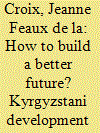

|
|
|
|
|
| Publication |
2013.
|
| Summary/Abstract |
The development industry has moved from concepts of aid and technical assistance to the idea that closing 'gaps' in people's knowledge is the most effective way of alleviating poverty and injustice. My data show the means through which this 'knowledge transfer' is actually supposed to happen. I examine the micro-politics of development: the role and agency of development workers, who are so frequently employed to conduct 'training' on a wide range of topics affecting citizens' well-being, such as conflict prevention or sustainable agricultural practices. This paper draws on ethnographic research between 2010 and 2012 with Kyrgyzstani NGO workers to analyse the 'side-effects' of development, such as the creation of a new social class and softening age hierarchies. I examine the widespread conviction among trainers that education can solve most social ills, and their concepts of how knowledge, sometimes in the guise of ideologiya, shapes people. I argue that this faith in knowledge reflects both the life course of NGO workers themselves and what they can offer from within the 'knowledge transfer' paradigm. An understanding of the friction between different expectations of knowledge content, teaching relationships and aims in creating well-being is not only essential to a critical reflection on these development efforts but also illuminates wider political and social processes and relationships, such as expectations of the state and international community.
|
|
|
|
|
|
|
|
|
|
|
|
|
|
|
|
| 4 |
ID:
094167
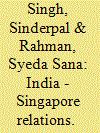

|
|
|
| 5 |
ID:
167045
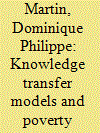

|
|
|
|
|
| Summary/Abstract |
Many government of developing countries show their commitment of reducing extreme poverty. A dominant thought considers that economic growth should be based on capital accumulation, productivity improvement, and access to international markets. This article tracts the system of assumptions that developing countries should meet to ensure that transfer models from developed countries could be efficient. We suggest a rebuilding of the transfer model by identifying some “structuring” conditions of developing countries, in particular by empowering universities to take a central role in the regional development process. From a poverty reduction perspective, the focus should be on the sustainability of local socio-technical systems, even if the options chosen are less efficient in the short term.
|
|
|
|
|
|
|
|
|
|
|
|
|
|
|
|
| 6 |
ID:
159344
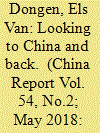

|
|
|
|
|
| Summary/Abstract |
Against the background of the rise of ‘diaspora institutions’ since the early 2000s, this commentary reflects on China’s diaspora engagement and India’s interest in it in the context of its own institutionalisation of diaspora engagement since the early 2000s. It argues that notwithstanding historical and political differences, some lessons could be learned from China. These pertain to the importance of recognising the various segments of the diaspora; the role of community organisations; the centrality of diaspora research; and the connection between diaspora policies and shifting national priorities. However, both in China and in India, some principal limits remain in terms of diaspora engagement due to the prioritising of the socio-economically advantaged; the tension among cultural, ethnic and territorial understandings of the nation; and because political inclusion lags behind the focus on economic and knowledge contributions. These limits lead us to reconsider some of the shared ideas, assumptions and practices behind the rise of ‘diaspora institutions’ in a broader sense.
|
|
|
|
|
|
|
|
|
|
|
|
|
|
|
|
| 7 |
ID:
158298
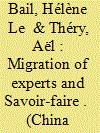

|
|
|
|
|
| Summary/Abstract |
This article focuses on the practice of French cuisine in Shanghai and questions the permanence of this professional niche. It combines an anthropological approach to culinary techniques with a sociological approach to workforce migration, tracing the ways in which the discourse and practices of chefs and maîtres d’hôtel working in French cuisine’s restaurants employ forms of ethnocultural and technical legitimacy. The case of Shanghai, a city undergoing rapid transformation in its modes of consumption, provides a clear illustration of the shifts that have occurred over the last ten years in the hierarchy of Western migrants and Chinese locals: the symbolic and material privileges offered to the former are beginning to disappear, and professional recognition is increasingly becoming based on savoir-faire and a strong work ethic.
|
|
|
|
|
|
|
|
|
|
|
|
|
|
|
|
| 8 |
ID:
167845
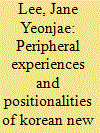

|
|
|
|
|
| Summary/Abstract |
This article examines the peripheral experiences of skilled return migrants in their homeland and the wider social implications of global knowledge transfer. Through a case study of Korean New Zealander returnees, I argue that the process of skill transfer is not easy, as shown by the returnees’ difficulties and social alienation. Korean New Zealander returnees have a more alienated experience than Koreans of similar backgrounds returning from other Western countries.
|
|
|
|
|
|
|
|
|
|
|
|
|
|
|
|
| 9 |
ID:
163232
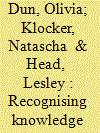

|
|
|
|
|
| Summary/Abstract |
This article explores knowledge transfers in international migration and development through insights from Pacific Island seasonal workers participating in Australia's Seasonal Worker Programme (SWP). We discuss actual and potential horticultural knowledge transfers that are enabled when circular migrants are engaged in agriculture in their place of migration origin and destination. Transfers identified by seasonal workers themselves include: technologies to improve horticultural production, exposure to different crop types, and techniques to improve crop yields. We argue that SWP migrants should be reframed as knowledge holders (not ‘unskilled’ or ‘low‐skilled’ labourers), and reflect on how knowledge transfers can be better supported to enable benefits for communities of origin and destination.
|
|
|
|
|
|
|
|
|
|
|
|
|
|
|
|